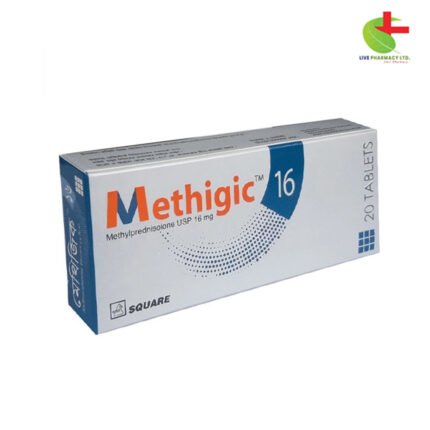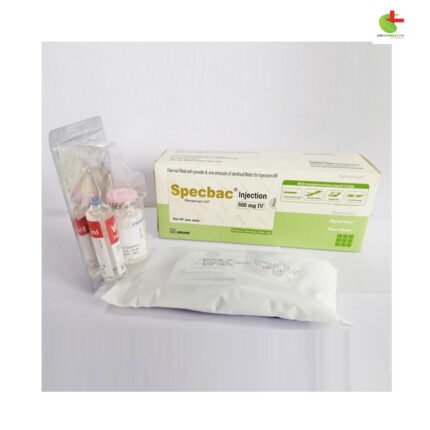Methigic 2
30.00৳ Strip
- Methigic: A potent anti-inflammatory steroid
- Treats rheumatic disorders, dermatologic diseases, allergies, and more
- Superior anti-inflammatory potency compared to prednisolone
- Careful dosage adjustments and monitoring minimize side effects
 Brand
Brand
|
Square Pharmaceuticals PLC |
|---|---|
 Generics
Generics
|
Methylprednisolone |
Indications
Endocrine Disorders: Primary or secondary adrenocortical insufficiency, congenital adrenal hyperplasia, nonsuppurative thyroiditis, hypercalcemia associated with cancer.
Rheumatic Disorders: Rheumatoid arthritis, juvenile rheumatoid arthritis, ankylosing spondylitis, acute and subacute bursitis, synovitis of osteoarthritis, acute nonspecific tenosynovitis, post-traumatic osteoarthritis, psoriatic arthritis, epicondylitis, acute gouty arthritis.
Collagen Diseases: Systemic lupus erythematosus, systemic dermatomyositis, acute rheumatic carditis.
Dermatologic Diseases: Bullous dermatitis herpetiformis, severe erythema multiforme (Stevens-Johnson syndrome), severe seborrheic dermatitis, exfoliative dermatitis, mycosis fungoides, pemphigus, severe psoriasis.
Allergy: Seasonal or perennial allergic rhinitis, drug hypersensitivity reactions, serum sickness, contact dermatitis, bronchial asthma, atopic dermatitis.
Ophthalmic Diseases: Allergic corneal ulcers, herpes zoster ophthalmicus, anterior segment inflammation, sympathetic ophthalmia, keratitis, optic neuritis, allergic conjunctivitis, chorioretinitis, iritis, iridocyclitis.
Respiratory Diseases: Symptomatic sarcoidosis, Loeffler’s syndrome not manageable by other means, berylliosis, aspiration pneumonitis.
Hematological Disorders: Idiopathic thrombocytopenic purpura in adults, secondary thrombocytopenia in adults, acquired (autoimmune) hemolytic anemia, erythroblastopenia, congenital (erythroid) hypoplastic anemia.
Neoplastic Diseases: Palliative management of leukemias and lymphomas in adults, acute leukemia in childhood.
Edematous States: Induce diuresis or remission of proteinuria in nephrotic syndrome, without uremia, of the idiopathic type or that due to lupus erythematosus.
Gastrointestinal Disease: Tide the patient over a critical period of ulcerative colitis, regional enteritis.
CNS Disease: Acute exacerbations of multiple sclerosis.
Description
Methigic is a potent anti-inflammatory steroid, surpassing prednisolone in anti-inflammatory potency with less tendency to induce sodium and water retention. Its relative potency to hydrocortisone is at least four to one.
Pharmacology
Methylprednisolone profoundly inhibits the immune system by primarily binding to intracellular glucocorticoid receptors, influencing various bodily systems including kidney function, fluid & electrolyte balance, lipid, protein, and carbohydrate metabolism, skeletal muscle, cardiovascular system, immune system, nervous system, and endocrine system.
Dosage & Administration
Dosage ranges from 2-48 mg daily in divided doses, depending on the specific disease being treated. Initial and maintenance dosages should be individualized based on the patient’s response and disease severity.
Interaction
Several medications can interact with Methigic, altering its metabolism or efficacy. It’s crucial to consult a healthcare professional before combining Methigic with erythromycin, clarithromycin, phenobarbital, phenytoin, rifampin, ketoconazole, estrogens, cyclosporin, or blood thinners like warfarin.
Contraindications
Avoid Methigic in cases of systemic fungal infections or known hypersensitivity to its components.
Side Effects
While short courses of Methigic are generally well-tolerated, long-term, high-dose usage may lead to serious side effects, ranging from fluid retention and weight gain to more severe complications such as glaucoma, cataracts, and growth retardation in children.
Pregnancy & Lactation
Methigic is categorized as pregnancy category C, meaning its use should be carefully considered in pregnant individuals, weighing the potential benefits against the risks to the fetus. Its safety during lactation has not been adequately evaluated.
Precautions & Warnings
Patients should be monitored closely for adrenal insufficiency even after discontinuation of therapy. Special caution is advised in patients with ocular herpes simplex, hypothyroidism, or cirrhosis. Careful observation of infants and children on prolonged therapy is essential for monitoring growth and development.
Overdose Effects
While overdose cases of glucocorticoids are rare, supportive and symptomatic treatment should be provided in the event of acute toxicity. Serum electrolytes should be closely monitored.
Therapeutic Class
Methigic belongs to the class of glucocorticoids.
Storage Conditions
Keep Methigic in a cool, dry place, away from light, and out of reach of children.













Reviews
There are no reviews yet.